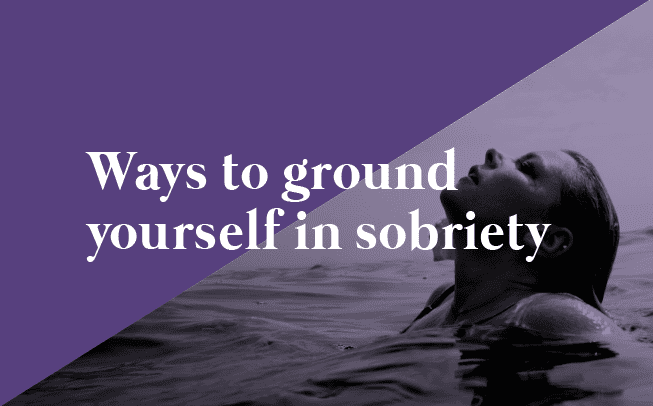
by Paul Churchill | Apr 15, 2019 | Blog, The first Year
I’m going to cover the techniques I use to ground myself when I’m having a rough day, or am feeling anxious. Let’s face it, there can be times in sobriety when we find ourselves taking things one day at a time (ODAAT), or one hour at a time (OHAAT), or one minute at a time (OMAAT). Sometimes on this journey, we’ll find ourselves logging days in our sobriety tracker apps like it’s no thang! Other days, we wake up and quickly realize keeping the mind in check will be a constant struggle. So here are some of my favorite techniques I use to ground myself, to pull myself back into the body, away from the mind and into the present moment.
- Acknowledge what is happening – Anxiety is great at tricking you into believing that something is real. So all these fear-based thoughts you are having are simply that: thoughts. Thoughts aren’t real. Once you acknowledge this and say “wait a second” I’m not going to die, and in a couple of hours, one or two days tops, this will all be fine.”
- Think in terms of we. Which of these two sentences sound better – 1. I am struggling right now. 2. We are struggling right now. Most of us orientate our thoughts to the individual self, but science is showing, we receive a great benefit when we think of terms of “we” which isn’t a lie because we are all connected. It’s totally fine to struggle on this journey, but there is no need to struggle alone.
- Take your shoes off and walk outside barefooted. This is literally called grounding or earthing. You, all people, animals, plants, and inanimate objects are electrical beings living in an electrical world. Everything that’s made of atoms (so…everything) has a net charge that’s either positive, negative, or neutral. Grounding means discharging built-up static electricity either directly into the earth. The earth has a negative charge, and you have a positive charge. Walking barefooted in grass, or on the beach allows you to release an excess of unbalanced energy. If you’re pacing back and forth with anxiety, do it outside without shoes. You’ll instantly start to feel better. There are several books written on this topic that shed light on why earthing is so powerful!
- Usually, when we find ourselves spinning out, we’re moving too fast. We’re rushing through the day seeking ways to mitigate inner turmoil, but we’re going to fast to find what we’re looking for. As Jane Wagner would say, “for fast-acting relief, slow down.” Usually, when we are in this perpetual “crazed” state, all tasks are done as a means to an end and little quality or presence is attached to any duties. I always tell myself, if you want to get somewhere fast, go slow. When I encounter a flight of stairs, I make a point to climb or descend the staircase slowly, making conscious contact with each stair. When I park my car, I wait till I see the clouds moving before exiting the vehicle.
- Do not multitask – Studies show that human beings are terrible at multitasking. If you find yourself talking at the phone, and sending an email or text at the same time, most likely you’re not doing any of these tasks well.
- You are nature, so take a time out, and go be in your natural setting. Ideally, pick a location with a soundtrack such as a stream, birds chirping, or the sound of the wind in the trees. Ideally, I try to go for a hike or walk in nature without shoes. Almost all of these grounding techniques can be done in tandem!
- When I’m not feeling grounded, I start paying close attention to where this feeling is located in the body, more specifically in the stomach and solar plexus area. Almost always, I recognize this region is tensed up and tight. When I feel anxious, I notice my stomach muscles are always flexed, and my breathing becomes shallow. Once I’m aware of this, I can start breathing from the belly and relaxation sets in.
- Stop saying I CAN do this, because you ARE doing this. It doesn’t matter where you currently find yourself on this journey into sobriety, you ARE doing this!
- Go with the gut. 11 billion bits of information bombard your energy field every millisecond and most report to the gut area and not your head. Always trust the gut/intuition on where to go next, even if it seems like a 180 from what the mind is saying.
- I tell myself “this isn’t me.” A couple of months ago, I found myself unable to fall back asleep because my mind wouldn’t stop going. It was frustrating and I deeply needed sleep since I had a busy day ahead of me. After about 30 minutes of the mind trying to solve every problem on the planet, I finally said, “Paul, this isn’t you.” and within a matter of minutes, I was asleep. As Michael Singer says in “The Untethered Soul.” you are not the voice inside the head, but the one who hears it!
These grounding techniques are highly effective when the edge of life is sharp, or when we experience a craving to drink alcohol. I encourage you to practice these before an emotional rollercoaster arrives so you’re better prepared to ride out the uncomfortable feelings or cravings. Let me know in the comments what helps you get grounded.
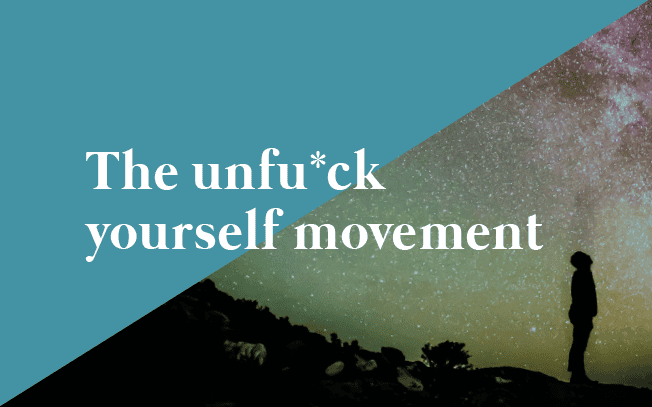
by Paul Churchill | Apr 9, 2019 | Blog, Early Sobriety, The first Year
I was in a bookstore at the airport the other day and noticed a trend while looking at the top twenty best sellers. There were several books with clear, unambiguous titles. Our society collectively is starting to wake up and is looking for ways to unfuck themselves. These are the book titles I saw that were all clumped right next to each other. 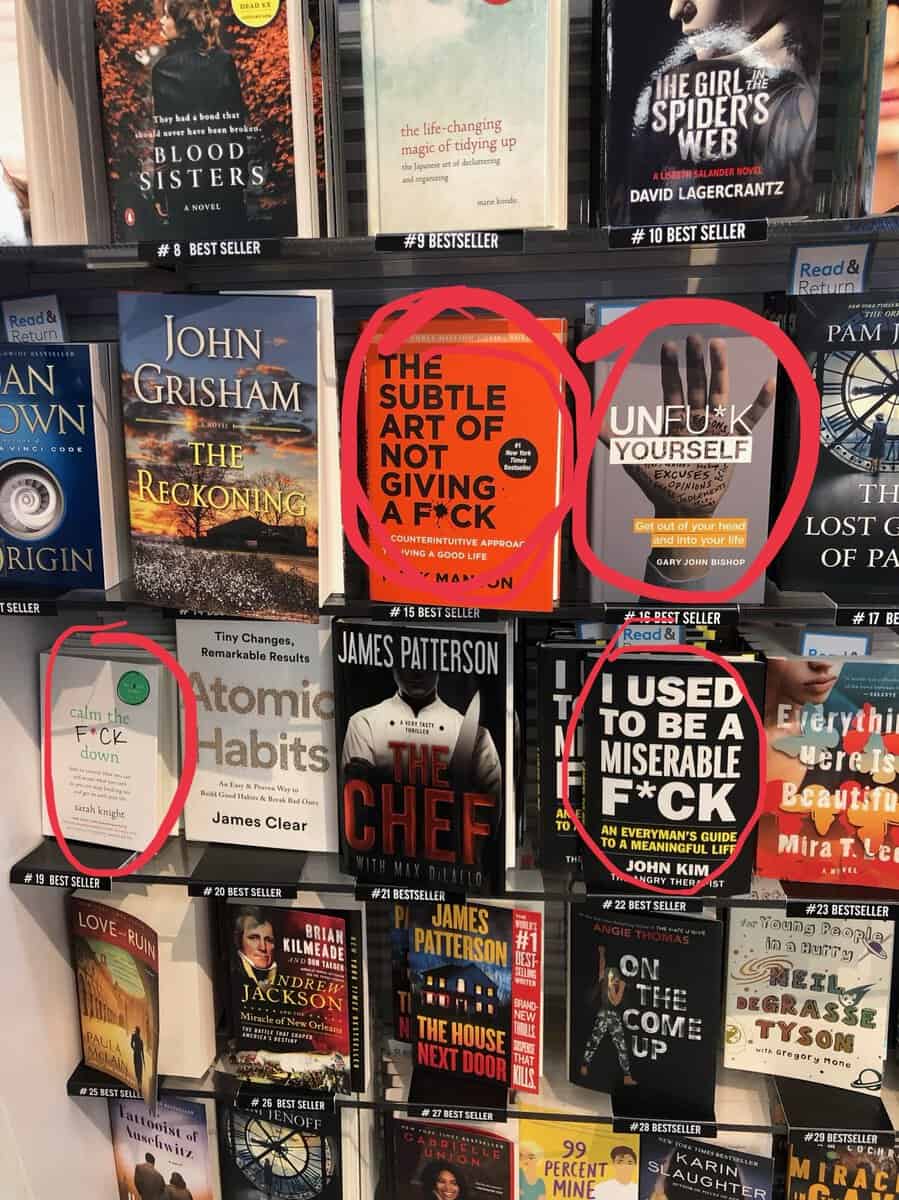
UnFu*ck yourself by Gary John Bishop
I used to be a miserable Fu*ck by John Kim
Calm the Fuck down – Sarah Knight
The Subtle Art of Not Giving a Fuck Mark Manson
After a quick Amazon search, I found several more books with similar titles such as
Unfuck your Brain by Faith Harper
Unfuck Yourself by Zoe Swain
I’m currently writing a book about alcohol addiction, and I’m not 100% sure of what my book title will be, but it may have the words unfu*ck yourself somewhere on the cover. I want to be clear, I had this written down on my list of potential book titles for a long time, not just because I saw a bunch of these titles in the airport:) The title at this moment is Alcohol is Shit | but it’s also the invitation. Below that title, it will say either, “control alcohol from the inside out” or “Unfuck yourself from the inside out.” Not sure yet. Let me know your thoughts in the comments.
All these books, including mine, isn’t fulfilling a niche or a trend, they are representing a movement that can no longer be ignored. There’s a consciousness on this planet that is starting to say, hang on a second, this isn’t working. Those of us who struggle with addiction, sometimes think we’re the only ones who reach a rough spot on life. Not true, everyone does, and we’re reaching a critical mass, especially in America. On a global scale, people are starting to say, timeout, hold the phone, the formula that I was told to follow in life, isn’t yielding the fruits I was promised.
I recently read an article titled the Age of Anxiety in the New Republic that sheds light on this movement.
According to studies by the National Institute of Mental Health, nearly 20 percent of Americans experience an anxiety disorder in a given year; over 30 percent experience an anxiety disorder over the course of their lifetimes. And the rate is rising: The American Psychiatric Association, in a May study drawing from a survey of 1,000 American adults, diagnosed a statistically significant increase in national anxiety since 2017.
Please read carefully. There is nothing fundamentally wrong with you. Right now, at this moment, there’s nothing wrong with you. Never has been and never will be. Take a deep breath; we are okay. This anxiety is a good thing and shouldn’t be labeled in some diagnostical statistical manual as bad because this collective state of unrest will eventually show us the way.
According to the article in the New Republic, this jittery national mood has given rise to what Rebecca Jennings at Vox has dubbed “anxiety consumerism”—the rise of a plethora of products, from fidget spinners to essential-oil sprays, to weighted blankets. These weighted blankets were initially developed for people with autism and PTSD as self-administered hugs, to give the sensation of an embrace, but sales for these blankets have gone through the roof, and everyone is buying them. Perhaps the most well-known product to fall into this anxiety consumerism category is alcohol. Just about everyone on the planet right now needs a big hug.
Who is going to initiate this hug?
Those who struggle with addiction are the trailblazers in the collective unf*ck yourself movement that desperately needs to happen. Not just for those who grapple with addiction to alcohol, but for everyone. As a global community, we’re starting to see what’s not working and alcoholics were the first to see it. We are leading this movement and will eventually be the ones who hold the door open for the rest of society. Let that last sentence sink in for a second. You and me. We will be leading the global unfu*ck yourself movement for everyone. Not just those who struggle with addiction.
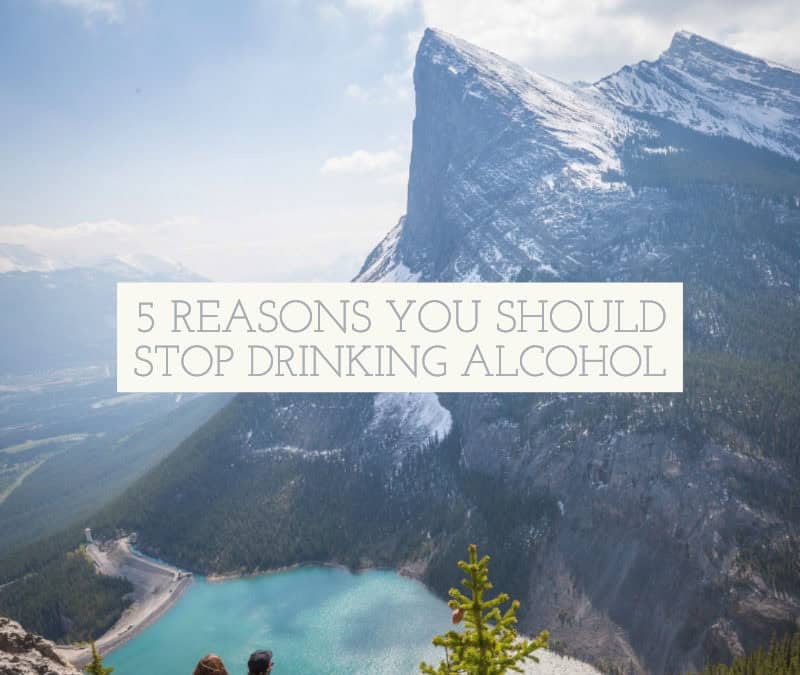
by Paul Churchill | Mar 28, 2019 | Blog, Helpful Tips, Resources, The first Year
I was completely ignorant of how beneficial giving up alcohol would be to the overall quality of my life. After all, alcohol became me. I spent a huge chunk of my life intimately interacting with alcohol, completely isolated from any other solution. When I was first introduced to recovery, a life absent of alcohol, I wasn’t convinced that it was for me. Fear crept in and I rebelled against the idea of letting go of my vice. Until one day, the pain I was experiencing was far greater than my fear of change. First, I had to admit to my innermost self just how detrimental my drinking had become and the magnitude of the harm I was causing myself and others.I was pleasantly surprised to find that giving up alcohol enhanced my life so much more than I ever could’ve imagined.
If you are unconvinced and on the fence about sobriety, let me be the first to assure you that things will only get better. What’s the worst that can happen? You may face conflict and resistance at first. Once you get over the initial slump, I can assure you, your life will approve drastically once you reach the other side of alcoholism. Here are 5 reasons you should stop drinking alcohol.
Health Improvement
One of the most obvious reasons you should stop drinking is because of the direct negative effects of alcohol abuse. Heavy drinking increases your risk of obesity, diabetes, cirrhosis, kidney failure, and heart disease. When you make the decision to stop drinking alcohol your overall health wellbeing will improve in a multitude of areas:
-
Brain: A recent study suggests that as little as two weeks, of sobriety, can reverse and even heal damaging effects of alcohol on the brain.
-
Heart: Abstinence from alcohol will decrease your chances for developing high blood pressure and your risk for heart attack or stroke.
-
Skin: Alcohol is a potent diuretic. When you stop drinking alcohol, your skin’s elasticity will return as you naturally become more hydrated.
-
Weight: The calories found in alcohol are void of any nutritional value, but rather are filled with empty calories. Your appetite will soon return and you will consume nutritional foods rather than consuming unhealthy sugars.
Emotional Stability
Alcoholics spend most of their lives trying to numb all emotions with alcohol. When you stop drinking, your emotions may be all over the place. In fact, I had a hard time even identifying my emotions when I first got sober. Eventually, that changed. Consuming alcohol can lead to incomprehensible demoralization, which ultimately ends in guilt and shame. Absent from alcohol, guilt is eliminated. Quitting alcohol can relieve symptoms of anxiety, depression, encourage longer/deeper sleep, and overall stabilize mood.
Financial Freedom
When I was drinking, life was tough. Not only was I spending way too much on alcohol, but I evaded any/all financial responsibilities. Eventually, I wasn’t able to be much use at work either. Without alcohol, you are able to be a productive member of society. The money spent on alcohol can be spent on repaying old debts and current bills. Financial freedom comes, once you put down alcohol.
Mental Clarity
Mental clarity, memory, and focus are seriously impaired when under the influence of copious amounts of alcohol. The benefit of not drinking alcohol will directly impact your mental clarity. I don’t know about you, but the mental fog I experienced on a daily basis created many problems for me. My memories were skewed, my thinking was delusional, and I couldn’t focus on any task that didn’t involve drinking more. When you give up alcohol, the fog is lifted. One study followed a group of men and women with at least 6 months into their sobriety. Researchers were unable to distinguish any cognitive differences between the recovering drinkers and the non-drinkers.
Quality Relationships
One of the most meaningful benefits of my sobriety is the quality of the relationships in my life today. Truth be told, when I was drinking I was unable to maintain any healthy relationship. I had an unhealthy love affair with alcohol. I was a horrible friend, daughter, mother, and human in general. I preferred isolation over engaging in interpersonal relationships. When you quit drinking alcohol, the veil is torn away. You may find acceptance of relationships that have been damaged, beyond repair. Communication doesn’t ignite fear but rather it becomes a healthy necessity. You are able to make healthy choices and mend broken relationships
When you first stop drinking, you may feel like a total train wreck. (That’s how I felt) It didn’t take long before all of the promising benefits of sobriety, started to become my reality. I’m not sure I ever experienced the mental, physical, spiritual, and emotional freedom prior to getting sober. Without the commands of alcohol shackling you to self-propelled misery, the world is your canvas. When you decide to stop drinking you get the opportunity to live a life beyond your wildest dreams.
This is a guest post from Tricia Moceo who is an Outreach Specialist for Recovery Local, a local addiction/recovery-based marketing company. She advocates long-term sobriety by writing for websites like detoxlocal.com, providing resources to recovering addicts, and shedding light on the disease of addiction. Tricia is a mother of two, actively involved in her local recovery community, and is passionate about helping other women find hope in seemingly hopeless situations.
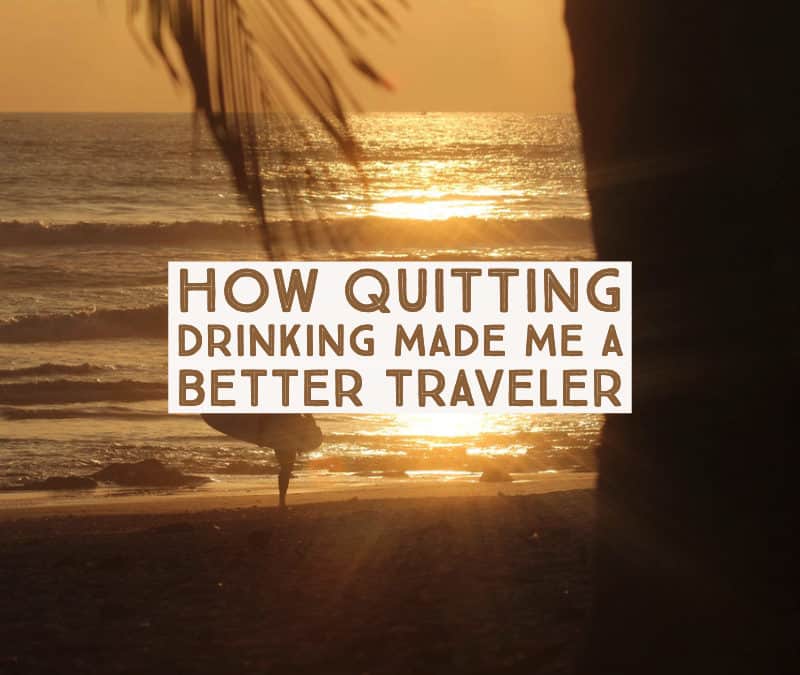
by Paul Churchill | Mar 6, 2019 | Blog, Expectations, The first Year
By Claire O’Brien
A few months before I quit drinking for good, the husband and I stole a few days to lounge on the sand at the Delaware Shore. It was September, and the air was still warm but the crowds had thinned, leaving us the wide beaches to ourselves.
We had three entire days to soak up the sun and watch the dolphins dart among the waves. So, I was pretty annoyed to wake up one morning so hungover that I had to grit my teeth to force myself to face the day.
A few precious days that we’d paid a lot of money for, which I was now just trying to survive. At brunch, I’d order coffee (obviously), and avocado toast (healthy!) and make chit-chat with my husband about how to spend the day. He might not notice, but I’d be distracted, hardly present at all, because mentally I’d be berating myself for swilling that extra glass of red wine, again.
Maybe I wasn’t the biggest drinker you’d have ever met. But, I definitely had a habit, and it was getting old. Frankly, so was I. How many days traveling over the last 20 years had I wasted from overindulging? I couldn’t even guess.
But, what’s traveling without drinking anyways? Swilling pints of lager in cozy London pubs. Pounding shots of rakija in Croatia. Sipping wine with every meal in France. Spilling sticky cups of rum and cola on the dance floor in Belize. And a personal favorite, guzzling margaritas from a can in Mexico. Traveling means experiencing life to the fullest! That means alcohol. And lots of it
Less than a year later, I was back in Rehoboth Beach for my 2-year wedding anniversary. This time, I was six months into my post-alcohol experiment. I booked a B&B, famous for its waffles in the morning and free wine in the evenings
Immediately, my mind flooded with anxious thoughts
“How can I travel without drinking?”
“How can I celebrate my anniversary without alcohol?
and most urgently, “But…free wine!”
Then I remembered that I once celebrated a trip to the grocery store with wine. So…maybe my excuses are still pretty flimsy
It rained all three days in Rehoboth Beach on that trip. I didn’t drink. It was totally fine. In fact, it was much more than fine. I spent too much money on used books and antiques. We took the ferry over to New Jersey and explored the Victorian town of Cape May. We ate fresh seafood. I challenged the waiters to bring me “the funnest” non-alcoholic drink they could invent

Instead of being a liability, I woke up early to research activities. I assumed the podcast DJ duties on the drive. I made ridiculous observations intended to make the husband laugh. When I returned home content and invigorated, rather than depressed and full of regrets, I conceded that perhaps I really was onto something.
Traveling without drinking is not only possible…but dare I say, preferable? Before you shriek “Heresy!” hear me out
Since that Delaware trip, I’ve spent several weeks in Scandinavia. My birthday fell during a 7-day work trip to Las Vegas. I spent a luxurious weekend in a Pennsylvanian resort and survived many visits home to California. I just returned from a week in the Netherlands. All accomplished without even one cheeky drink.
I’ve met other people that don’t drink while they’re busy exploring the globe. Some just don’t like it, some want to save money, and others were in recovery. At an afterparty in Rotterdam recently, my new friends hardly touched a drop of booze, just because! I’ve realized that traveling without drinking isn’t really about abstaining from this magical liquid worshiped the world over, but about feeling empowered to make decisions that work for you.
As a regular drinker, even if you don’t have an obvious problem, the ritual begins to make your world smaller. It’s imperceptible at first. Weekends might involve having a few drinks with friends. Soon, the two become completely intertwined. Next, your brain wonders,
“How can I even hang out with the girls without drinking?”
“Is it possible to attend this wedding without toasting with champagne?”
“How will I visit Scotland without sampling a few drams?”
“How can I survive Tuesday?”
In some ways, my lengthy travel resume, with its regular doses of the unfamiliar, prepared me for this new life sans alcohol. What’s more uncomfortable than quitting a 20-year habit, especially one that is both so soothing and socially encouraged? If the point of travel is to escape the ordinary, experience our differences, and push against the boundaries of what’s comfortable, then quitting drinking has, in fact, also made me a better traveler.
I’m more adventurous than ever.
I’ve always considered myself a risk taker. But that quality didn’t extend to my drinking ritual, which was really more of a drinking rut. Now, every restaurant, city, and country is an opportunity to sample the new. Frothy glass of hot pink dawet at a Surinamese restaurant in Amsterdam? Sure! Traveling in Sweden was a delightful surprise. I found an extensive non-alcoholic wine and beer list on every menu, none of which I would have glanced at before.
My adventurousness even extends beyond my drink choices. One random evening I came up with the idea that I should fly to every international destination served by a direct flight from Washington, DC. And write about it. Then, more astonishingly, I actually started doing it.
I’m more flexible.
Previously, every evening ended with drinks, with few exceptions. Now, experiences of all kinds are crammed into my days. In Las Vegas, I spent the evenings visiting the museums and aquariums. I splurged on fancy tasting menus and rented a vehicle to explore the desert. On a whim, I rode in a drift supercar around the Las Vegas Speedway. It was harder to be spontaneous when I was preoccupied with where I could buy wine on Sundays and wondering if I had remembered to pack my corkscrew.
I’m more responsible.
I was the type of drinker that managed to get shit done. But I was still just managing. Once, because I was so disorganized, my debit card was declined while attempting to buy a single stick of deodorant. I was 35 years old. Now, my kitchen is clean. All the dogs and humans in my house are current on their medical appointments. And there are probably fewer than three empty coffee cups floating around my car. I have a savings account dedicated solely to travel, which I diligently contribute to monthly. All trips get paid for in cold, hard, cash.
I have piles of money.
Ok, I’m not exactly stacking bricks of cash, but booze is expensive, especially when you are consuming it with the frequency I once found refreshing. Since my travel fund isn’t being depleted quite so rapidly due to lengthy pub sessions, I’m able to spend more on quality experiences. Like upgrading to Economy Plus!
I have more fun.
Ironically, I’m more outgoing and social since giving up the hooch. The dark cloud that followed me around gradually evaporated, making a cheerful and upbeat mood my default personality. Who knew? Now I’m the person planning adventures, not bailing on invitations at the last minute. I’ve instigated weekends away for welding classes, white water rafting, tree climbing courses, and exploring Jamaica while encouraging friends and family to join me.
I’ve become more resilient.
It didn’t happen overnight, but I developed healthy* coping techniques for stress, boredom, and all of the feels that I don’t like. Things still go wrong when I travel. In Richmond, the husband got food poisoning courtesy of a dodgy roadside gyro. In Sweden, it was an AirBnB fiasco. In Las Vegas, I mysteriously scratched my cornea and required medical attention. Now it’s easier to figure out what I need to do next without requiring an entire bottle of wine to cope.
Note: *Debatable if coconut ice cream with Magic Shell chocolate topping qualifies as healthy.
I’m more authentic now.
Confronting my worst habits and the role my ego played in prolonging the behavior was a humbling experience. The process of building new habits in their place, however, has grown my confidence. Also, without the daily dose of self-loathing, waking up every day as myself isn’t so bad. I don’t have to present as anyone else or hide parts of my life of which I’m ashamed. So, I’m able to more sincerely connect with people both at home and while traveling. Since I’m less distracted by my own internal dramas, I’m more interested in getting to know you.
I’m also less judgemental.
Like most well-traveled people, I considered myself to be very open-minded. Conversely, like most drinkers, I distrusted people who didn’t drink! I viewed cultures and customs that didn’t embrace alcohol with extreme skepticism. Now, that’s no longer an issue, which has opened up parts of the world and experiences I wouldn’t have seriously considered before. (Seven-day silent meditation retreat, no problem! Well…)
My life is bigger.
Probably not a coincidence, but around the same time I gave up alcohol, I completely restarted my professional career from one in the sciences to a more creative field. Five years ago, my options seemed few, and now I’m limited only by the hours in the day. Because there’s less holding me back, there’s much more space to move forward. Opportunities seem to be present everywhere. Travelling has become less of a selfish pursuit of simply accumulating more countries. Now it’s more of a shared experience, of learning, of inspiring myself and connecting with others.
Sure, there’s the occasional pang for the experiences I’ll miss. I’m human.
My brain sends up random flares like, “I might want to go to Tokyo next year. Clearly, this will be impossible to do and not drink sake.”
It’s a little bit like having a fleeting thought about an old lover. For a brief moment, the fantasy, the “What if?”, is seductive.
“Don’t I deserve some fun? Let’s be exciting and a little dangerous!”
It’s also the perfect way to create a total dumpster fire out of this otherwise satisfying life I’m building.
My love of travel stems from life’s possibilities. Endless combinations of routes to plan, experiences I haven’t had, people I haven’t met, and future memories I’ve yet to make. It’s not such a sacrifice for me to skip a few cocktails when the payoff could be so much bigger, and bolder. When I finally put down that drink, I found that I held a nonstop ticket to the rest of my life, and I want to see where it goes.
Additional blog posts by Claire O’Brien can be found at her webiste the Virgin Colada.
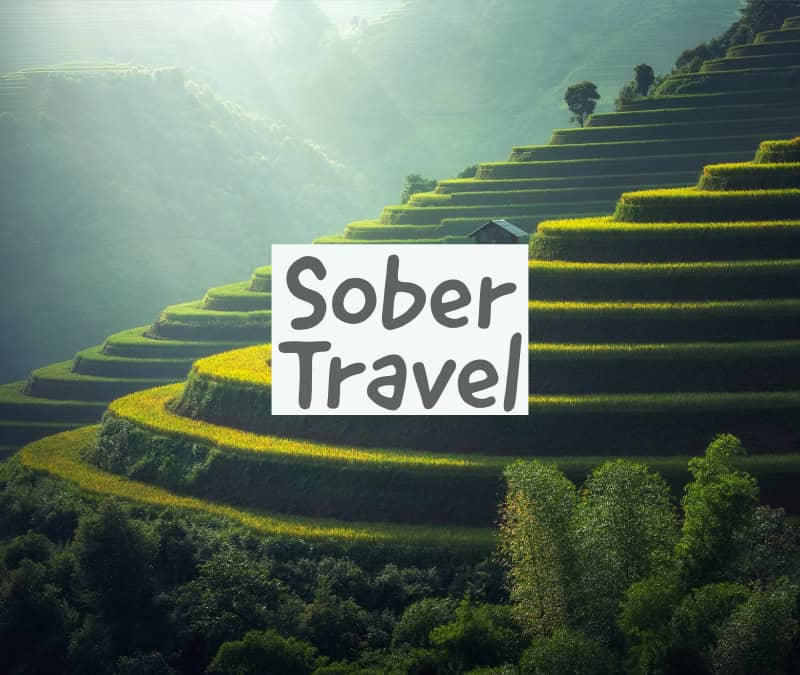
by Paul Churchill | Jan 22, 2019 | Blog, Helpful Tips, Resources, The first Year
We all love to travel
Nearly every online dating profile can confirm this. We only have a finite amount of time on this planet, and we have a pull to see as much of it as possible. This can be an incredible experience, especially when we’re traveling with fun light-hearted people. When traveling, our guards are often down, and our heart opens to the present moment. The sights, sounds, and smell are all taken in. We are fully present, and this is where the magic happens.
A trip from hell
Traveling the globe is great until it becomes a nightmare. In 2014, I was a counselor for a high school trip, and we had just finished the Inca Trail and exploring Machu Picchu (this is where I got the idea for the 2018 sober travel itinerary to Peru). I had plans to continue my travels after the students returned to Colorado and I was ready to strap on the backpack and let the wind take me. That was the plan at least.
I said goodbye to the group and had every intention of staying sober for the rest of my trip. That internal declaration lasted no more than two hours, and I found myself drunk at the hostel bar later that evening. For the remainder of my stay in South America should have been the sober vacation of a lifetime, but it ended up being a disaster where I wanted to hit the eject button nearly every moment.
Death Road mountain bike tour
After that, I traveled to Puno and visited the highest freshwater body of water on the planet, Lake Titi Caca. Then I visited La Paz Bolivia where I saw Guns and Roses on my birthday. They didn’t sell alcohol at the concert, so I saw it as a sign it was going to be my new sobriety date, my birthday! After the show, I was drunk followed by a brutal hangover for the Death Road mountain bike tour.
After that, I did a jungle tour in the Bolivian Amazon and was so thankful to hear I wouldn’t be near a bar or store that sold alcohol. Well, alcohol is everywhere, and ended up convincing a local to sell me 3 liters of beer. I was becoming demoralized, and the trip was only half done. Next up, my trip involved renting a car and drove (mostly drunk) through northern Argentina, then a 16-hour bus ride over the Andes into Chile where I vomited on myself twice. The bus driver apologized for the windy roads. To the day, I still don’t think he knew I was just flat out drunk. Oh yeah, I forgot about the salt flat in Bolivia and northern Chile. This is usually a highlight for travelers, but I was too hungover to exit the vehicle most days.
Will this trip ever end…
I found myself in northern Chile in the San Pedro de Atacama Dessert wanting nothing more than to just “go home.” I think I even googled “time machine” or “tele-transport” a couple of times in google searches. I was utterly defeated by alcohol at this moment, and I still had ten days left on the trip. I booked a stargazing trip in the desert of Chile which, apart from Machu Picchu, was the best part of the whole trip. During this stargazing excursion, I got a glimpse of the universe. A seed of spirituality was planted in my heart… For a moment, I thought I would be able to go the rest of the trip without alcohol.
Then Lima happened. I woke up every day promising myself I wouldn’t drink. I did so well until the sun went down. I did manage to attend a couple AA meetings in Lima which helped, but overall, it was a total dumpster fire.
I’ve also googled “dolorian time machine” in hopes that I can go back and to that trip again: sober. In fact, I wouldn’t be surprised if I go back and see these incredible places again. The difference this time is that I won’t do it alone.
Great Experience with Sober Vacations
After that vacation from absolute hell, the idea of sober travel vacations first arrived. I said, I love to travel, and I need to find a way to do it without being tempted to drink. Call it fate, destiny, or whatever, I then started the Recovery Elevator podcast, the sober communities Café RE and we just did our first international dry travel vacation to Peru in 2018 with 20 total attendees. During that trip, not one person drank. We had 20 people who have decided to live a life without alcohol and not one person drank. Incredible. On top of that, laughter seemed to be the theme of each day!
Next up is Asia January 20 – 31st, 2020. We will be flying into Bangkok, Thailand and departing Seam Ream, Cambodia. Apart from exploring two top destinations in Southeast Asia, we will be doing service work with Ourland, an elephant sanctuary, in Kanchanaburi. This sober travel tour should be the trip of a lifetime and simply cannot wait.
If you can’t make a Recovery Elevator sober travel vacation, and you still want to travel, here are some tips.
Tips for sober travel
- Go with a friend who knows you won’t be drinking. This person can hold you accountable and give you support in those difficult moments. Make sure this friend doesn’t prioritize alcohol.
- Go with a sober travel buddy – even better! If you have a sober friend ask them to travel with you.
- Attend an AA meeting. I’ve attended AA meetings in nearly a dozen countries and not only is it great support, it’s a quick way to meet locals. I went to a meeting in Mexico and then was invited to a BBQ at a local’s house. It was so much fun.
- Keep recovery in your pocket – My recommendation is Café RE, but there are several supportive online recovery communities.
- Don’t risk it – Wait till you have some solid sobriety footing before embarking on a sober vacation 2019. If you’re in your first 30 days of sobriety, it may be prudent to wait another couple of months.
- Do not stay at the party – many hostels are where the party happens. Do your research and make sure you have an exit strategy when you’re ready to call it a night.
- Be strategic with your destinations – If sobriety is your goal, then the Spanish party Islands Ibiza, probably shouldn’t be on the itinerary. Maybe think about visiting Morocco where alcohol isn’t part of the culture.
Don’t let your goal of sobriety hinder your travel plans. There are many ways to do this. I’ve been to over 15 countries sober, and I plan to add to that list! Sobriety has given me a life I could never could have imagined. Thanks for being part of it.
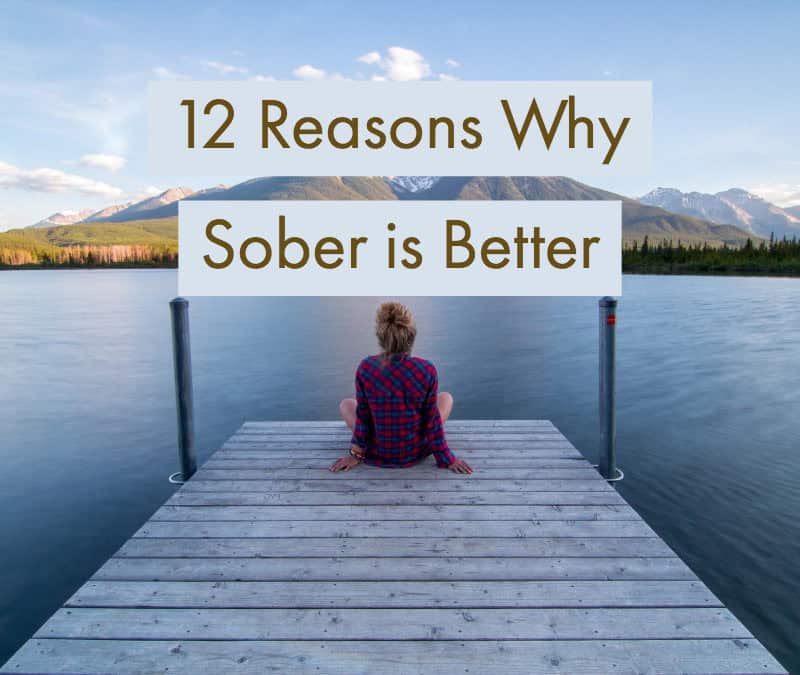
by Paul Churchill | Dec 31, 2018 | Blog, Expectations, The first Year
The decision to cut alcohol out of your life will pay off huge dividends in 2019 and much longer. Trust me…
Happy New Years Eve! Breaking news… You don’t have to drink today. In fact, over the years, I’ve met several people whose sobriety date was December 31st. You can have a hangover on the first day of the year, or you can wake up feeling refreshed. It’s up to you.
Deep down inside, at the core evolutionary level, we arrive on this planet fully equipped to live a happy life without any external substances. Especially alcohol. Here are 12 reasons why sober is better and why it’s a good idea to get the new year started off right with the Best Sobriety Podcasts.
1. Look you’re best
In Café RE, I see before and after pics posted all the time and oh my goodness are the transformations incredible. Within 30-60 days of quitting drinking, you’ll have people pull you aside and say, what’s your secret? You must be eating at the new vegan restaurant next door and are sipping on pure kale juice? I want to be clear, this statement has nothing to do with shedding pounds. I’ve seen people go up to their beautiful healthy weights, I’ve seen the color of people’s skin change, I’ve seen smiles return to faces.
2. Feel your best
More important than looking your best (external), you’ll start to feel your best (internal). I remember when I was drinking, the first 10-20 seconds when I woke up in the morning were intimidating. I knew I was going to feel less than average. Upon waking, I was afraid to fully assess the amount of damage I had done to my central nervous system the night before. The most important catalyst to feeling your best starts with sleep. While drinking, there was no quality sleep. If I could summarize how I feel in sobriety with one word, that would be – rested.
3. Alcohol can fix things you didn’t know were broken
Within time, you’ll start to notice issues (internal and external) slowly begin to fade away. These could be health issues or turbulent relationships with loved ones or co-workers. I never was a long-distance runner. I didn’t think I had the genetics to do it. I would tell myself that I’m built for quick bursts, like a cheetah. In sobriety and my normal one to three mile runs turned into five, seven and even a twenty-three mile ridge run race at year 3 in sobriety.
4. Make the most of your time spent on this planet
Human beings are awake on average 15 hours and 30 minutes per day. Make all the hours great. I remember towards the tail end of my drinking, the first 6-8 hours of every day were blah, at best. I’d then turn a corner and say, okay, I’m starting to feel better. A couple hours later I’d say, I’m feeling good, today is a good day. Unfortunately, at that moment, I’d also say, let’s take a detour from the present moment and start drinking. No matter how many times I promised myself today would be different.
5. Build better relationships
The opposite of addiction is connection and while we’re drinking, we’re not connecting. We may think imprinting our ass on a bar stool for hours at a time helps us build lifelong friendships that will endure the test of time, but that’s not the case. Conversations without alcohol are always more enjoyable. They’re authentic. Also, when we quit drinking, it will become clear who we need to spend time with.
6. Confidence
I had this feeling as a kid, and I think most of us had it at some time in our life, which was I can do anything if I put my mind to it. That feeling is better than any drink, drug, adrenaline rush, etc. In sobriety, you’ll find your inner voice saying things like, “I think I can do this,” which transitions into “I can do this,” to eventually, “I am doing this.” This state of mind was gone when I was drinking. Welcome back!
7. Less fear
The underlying level of fear in your life will drastically be reduced. You’ll be less afraid. You’ll stop making decisions based on fear. You’ll be more proactive in life instead of reactive. If we are always making decisions based on fear, we aren’t moving forward in life.
8. You’ll save a sh*&^t ton of money
According to my Recovery Elevator sobriety tracker, I have saved $37,486 since I quit drinking. This isn’t chump change found under a couch cushion. That’s a lot of money. This past April, I closed on a house on 1.5 acres outside of town. I’m surrounded by mountains, across the street is a 1,200-acre dairy farm, and the sunsets are epic. Down payment required for this house was, roughly the amount I’ve saved from drinking. This would have never happened if I was drinking.
9. You’ll be living in the present Moment
You’ll find yourself saying, what is this? This intangible presence that I can’t touch but I know is there. The thing that I’m hyper aware of that I never seemed to notice before. It must be the present moment. When we live in the present moment, depression (the past) and anxiety (the future) fade away. Why is the present moment so powerful? Because it’s all we have.
10. Avoid unnecessary disasters
You won’t be ruining your cousin Mindy’s wedding, or you won’t park a car in your neighbor’s pool. It seemed like once a year I did something I deeply regretted. At first, it was making an ass out myself at a party, but as the drinking progressed, the consequences became more catastrophic, like a DUI while driving to work in 2014. It’s nice to put substantial distance between me and those tragic events in life.
11. Create the future you want
I thought I could make the life I realized a reality while I was drinking, but that wasn’t the case. The grandiose goals and plans I projected in my future during my drunken states, never even reached a whiteboard when sober. As long as I was drinking, the tires of life were spinning in the sand and towards the tail end of my drinking, the tires were removed entirely. This is where sobriety gets exciting. The life transitions that I’ve seen take place are incredible. I met a guy named Patrick who attended the Peru trip and in sobriety, he has sold a portion of his shares in his restaurant group, purchased one of those “souped” up sprinter vans with Scandinavian interior finishes, bought like a 50 mountain ski pass and is living the life he’s always wanted to live. Anything is possible in sobriety.
12. You’ll start to make healthy memories
Within time, you’ll start to create new, fun and exciting memories. I’ll be honest, getting sober was a challenge, to say the least, but in the past four years, I’ve had some incredible memories and met some fantastic people. Several of these memories are from Recovery Elevator meet-ups. Some of them are epic sunrises with my standard poodle Ben. It’s also a compilation of the excellent smaller memories. It’s the little things that count!










